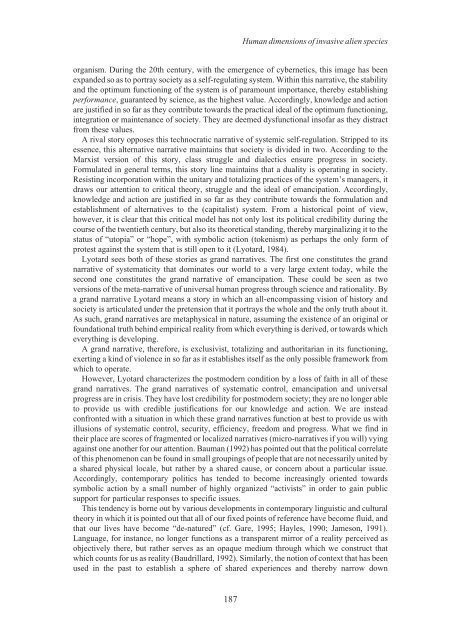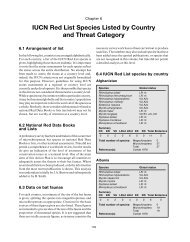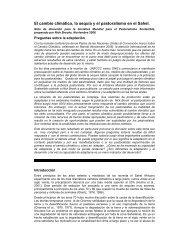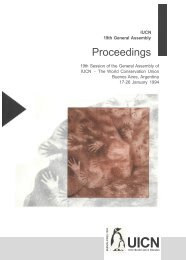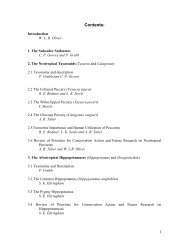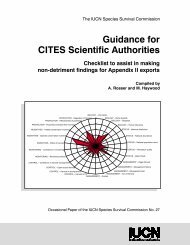Alien Species.vp - IUCN
Alien Species.vp - IUCN
Alien Species.vp - IUCN
Create successful ePaper yourself
Turn your PDF publications into a flip-book with our unique Google optimized e-Paper software.
organism. During the 20th century, with the emergence of cybernetics, this image has been<br />
expanded so as to portray society as a self-regulating system. Within this narrative, the stability<br />
and the optimum functioning of the system is of paramount importance, thereby establishing<br />
performance, guaranteed by science, as the highest value. Accordingly, knowledge and action<br />
are justified in so far as they contribute towards the practical ideal of the optimum functioning,<br />
integration or maintenance of society. They are deemed dysfunctional insofar as they distract<br />
from these values.<br />
A rival story opposes this technocratic narrative of systemic self-regulation. Stripped to its<br />
essence, this alternative narrative maintains that society is divided in two. According to the<br />
Marxist version of this story, class struggle and dialectics ensure progress in society.<br />
Formulated in general terms, this story line maintains that a duality is operating in society.<br />
Resisting incorporation within the unitary and totalizing practices of the system’s managers, it<br />
draws our attention to critical theory, struggle and the ideal of emancipation. Accordingly,<br />
knowledge and action are justified in so far as they contribute towards the formulation and<br />
establishment of alternatives to the (capitalist) system. From a historical point of view,<br />
however, it is clear that this critical model has not only lost its political credibility during the<br />
course of the twentieth century, but also its theoretical standing, thereby marginalizing it to the<br />
status of “utopia” or “hope”, with symbolic action (tokenism) as perhaps the only form of<br />
protest against the system that is still open to it (Lyotard, 1984).<br />
Lyotard sees both of these stories as grand narratives. The first one constitutes the grand<br />
narrative of systematicity that dominates our world to a very large extent today, while the<br />
second one constitutes the grand narrative of emancipation. These could be seen as two<br />
versions of the meta-narrative of universal human progress through science and rationality. By<br />
a grand narrative Lyotard means a story in which an all-encompassing vision of history and<br />
society is articulated under the pretension that it portrays the whole and the only truth about it.<br />
As such, grand narratives are metaphysical in nature, assuming the existence of an original or<br />
foundational truth behind empirical reality from which everything is derived, or towards which<br />
everything is developing.<br />
A grand narrative, therefore, is exclusivist, totalizing and authoritarian in its functioning,<br />
exerting a kind of violence in so far as it establishes itself as the only possible framework from<br />
which to operate.<br />
However, Lyotard characterizes the postmodern condition by a loss of faith in all of these<br />
grand narratives. The grand narratives of systematic control, emancipation and universal<br />
progress are in crisis. They have lost credibility for postmodern society; they are no longer able<br />
to provide us with credible justifications for our knowledge and action. We are instead<br />
confronted with a situation in which these grand narratives function at best to provide us with<br />
illusions of systematic control, security, efficiency, freedom and progress. What we find in<br />
their place are scores of fragmented or localized narratives (micro-narratives if you will) vying<br />
against one another for our attention. Bauman (1992) has pointed out that the political correlate<br />
of this phenomenon can be found in small groupings of people that are not necessarily united by<br />
a shared physical locale, but rather by a shared cause, or concern about a particular issue.<br />
Accordingly, contemporary politics has tended to become increasingly oriented towards<br />
symbolic action by a small number of highly organized “activists” in order to gain public<br />
support for particular responses to specific issues.<br />
This tendency is borne out by various developments in contemporary linguistic and cultural<br />
theory in which it is pointed out that all of our fixed points of reference have become fluid, and<br />
that our lives have become “de-natured” (cf. Gare, 1995; Hayles, 1990; Jameson, 1991).<br />
Language, for instance, no longer functions as a transparent mirror of a reality perceived as<br />
objectively there, but rather serves as an opaque medium through which we construct that<br />
which counts for us as reality (Baudrillard, 1992). Similarly, the notion of context that has been<br />
used in the past to establish a sphere of shared experiences and thereby narrow down<br />
187<br />
Human dimensions of invasive alien species


